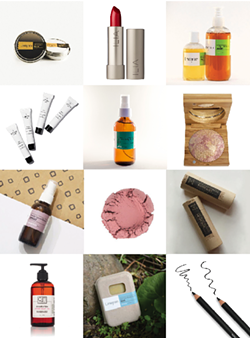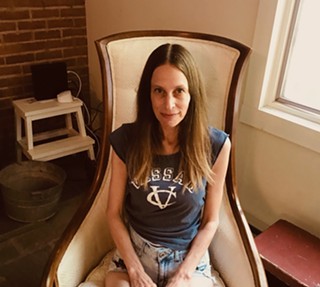The death of a friend is a powerful thing, generating enough force to spin a life in an entirely new direction. That was the case for Talima Davis and Allison Lamb, whose friend Tamara died of liver cancer in 2008, at the just-blossomed age of 28. When Tamara's doctor said the cancer was caused by toxins in her environment, and that those same toxins were probably accelerating the cancer's rapid growth, Davis and Lamb realized that things in their own lives needed to change. The two women, who were dating at the time, reached back to their families' roots in rural North Carolina, where their grandmothers were matriarchs of simple, clean living—and where sustenance and healing came from the garden and from natural home remedies. "We had to make an adjustment in ourselves to really start looking at what we put in our bodies and in our homes," says Lamb. In her Brooklyn kitchen, Davis started concocting her own cleansers and room sprays from organic and vegan ingredients like almond oil and witch hazel, to share with family and friends. Word spread and demand grew for the handcrafted goods, which were urban-born yet nurtured with the homespun simplicity of a Southern country childhood.
When Davis's cousin Tavasia died of breast cancer in 2012—again, they were told, from environmental causes—a sense of urgency propelled her hobby into a budding business. "I had had enough, and I could tell that Talima had too," says Lamb, who urged Davis to quit her corporate day job and shape her passion into a spunky wellness start-up. Now based in Newburgh—where a larger studio space is allowing the venture to scale up production—the multiuse natural beauty and skincare company Limegreen has become a family operation. The couple married in 2010, and Lamb joined Davis in quitting her job as well three years later—just before the birth of their daughter—to step into the role of Limegreen's co-owner and creative/marketing mind.
Plenty of would-be beauty companies start out in home studios, only to fall flat in an oversaturated market. But Limegreen has a differentiator: All of their products have at least three different uses. A balm works equally well to soothe cracked skin or a baby's bottom as it does to tame men's beards. Cleansers are all-in-one, applying to hair, face, body, and hands. A candle melts down into a fragrant massage oil or moisturizer. "Our grandmothers used baking soda for brushing teeth, cleaning, cooking," says Lamb. "Do we really need five different products that do five different things? Our lives today are so complicated; we're living in a time with so much excess. We want to give people ways to simplify." It's an ethos with appeal: Last December, Davis and Lamb were invited to join other entrepreneurs in pitching their products to beauty-industry leaders on the Lifestyle TV show Project Runway Fashion Startup—and were one of the few who were offered a $200,000 deal.
Up the Creek without a Hazmat Suit
As American consumers, we all too often get complacent: We forget that we're living in a kind of toxic soup. Dubious chemicals infiltrate our lives: flame retardants in furniture, mercury in fish, Teflon from nonstick pans. In 2005, the watchdog nonprofit Environmental Working Group (EWG) published a landmark study that found an average of 200 environmental toxins in the umbilical cords of US-born infants. The same report noted that 286 chemicals had been detected in umbilical cords from pesticides, pollutants, cleaning and cosmetics products, food packaging, flame retardants, and environmental waste. Since that report, we've learned more about the deleterious effects of those toxins, many of which have been linked to various cancers and which can cause birth defects or abnormal development, as well as diminished intelligence, behavioral problems, infertility issues, and metabolic dysfunction. The latest science even links environmental toxins to chronic diseases and epidemics like Alzheimer's and autism.
Armed with knowledge and vigilance, we can reduce our toxic load. Paying closer attention to our personal care products is one way to begin. According to EWG, the average American woman uses 12 personal care products that contain 168 unique ingredients. The average American man uses six products that contain 85 ingredients. "The cosmetics and personal care product industry is largely under-regulated," says Nneka Leiba, EWG's deputy director of research, noting that the Food and Drug Administration (FDA) has little authority to review the safety of chemicals in cosmetics or recall products that cause harm. Compared to other countries, our regulations are alarmingly loose: While the European Union has restricted the use of more than 1,000 ingredients in personal care products, the US has prohibited or restricted only 11 chemicals.


















